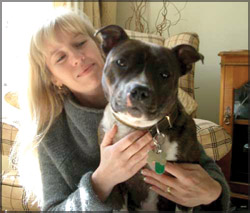Pet den
Taking your pet to the vet
When your dear pet gets sick, what would you do? Will you run to a
veterinary surgeon or will you go to the pharmacy and get 'something' to
cure it? Today our Veterinary Surgeon
Dr. D. A. U. Samankumara of the Kirindiwela Animal Clinic
educates you about choosing the right veterinary surgeon for your loving
pet.
There are two types of veterinary surgeons in Sri Lanka; those with
local degrees and those with foreign degrees. The one and only
veterinary degree in Sri Lanka is awarded by the University of
Peradeniya, Veterinary Faculty.
No matter what degree they have, they should be registered at the Sri
Lanka Veterinary Council (SLVC), with a registered number, to practise
as a doctor. There are many people, who have worked as clerks or helpers
for veterinary surgeons, now practising as doctors. These fake doctors
(quacks) will harm you and your pet with wrong and even dangerous drugs.
veterinary surgeons, now practising as doctors. These fake doctors
(quacks) will harm you and your pet with wrong and even dangerous drugs.
A vet treats a disease by knowing the theory and by diagnosing the
disease. If a fake vet tried this without any background knowledge, your
pet might experience drug reactions, even causing its death.
Anti-rabies, D.H.L. (Distemper, Hepatitis, Leptospirosis) and
deworming vaccines should be given according to the pet's age. If these
vaccines are not properly administered, they risk catching the disease.
The tragedy is that rabies and leptospirosis (commonly known as rat
fever) pose a risk to humans as well. So, we must always remember to go
to a vet surgeon to get our pets vaccinated and dewormed.
Another wrong step most pet owners take is asking pharmacists to help
them to choose the appropriate medicine. After all, they are just
pharmacists with little knowledge about diseases and drugs! Why should
you rely on them to get treatment?
When you take your pet to a doctor, you should always go to a person
who listens to you, who has the training and can diagnoses disease well.
You may have a family doctor to treat your family members; why not
have a family veterinary surgeon to treat your pets? Then, he/she will
know your pet's history, how you treat your pet, and the atmosphere your
pet is growing in. Thus, it will be really helpful when it comes to
diagnosing diseases.
You should take your new pet to the veterinary surgeon. You should
make it a point to ask about the vaccinations, vitamins, food you should
give, how to care for your pet and the things you should and should not
do.
You must take your pet to be vaccinated on the due date. Then only,
it will be very effective in the pet's body. When you are giving
vitamins and deworming drugs to your pet, you should always consult your
veterinary surgeon. Then he/she will decide the medicine, dosage and
such, by the pet's age and other factors. Drug overdoses may cause your
pet's death.
When your pet is sick, please don't take any chances. Go to a doctor
immediately. Otherwise, when it's eventually treated, it may be
vulnerable for side-effects.
When you go to a veterinary surgeon, he/she diagnoses the disease and
treats it through experience and ability. He/she also looks at the
following factors:
1. Pet's history - Its age and the diseases it has had.
2. Clinical signs - Symptoms of disease.
3. Lab report - If the doctor is not sure about the disease, he/she
will take reports on skin, blood and urine.
4. Treatment - The doctor might decide on a disease and start
treatment. If the pet is getting better, he /she can confirm the
disease.
5. Post-mortem - If birds in a farm are dying, a vet can examine
their bodies.
When the vet asks you about the history of the pet, you should be
able to provide this information. So, you should never send your pet
with others who don't know your pet well. You should keep an eye on your
pet, even while you are taking it to the vet.
You can be watchful about the urine colour, diarrhoea, vomiting, and
food intake. Before going to a vet, you should not give your pet
paracetamol or any other drug. Because if your pet was having a fever,
it would have gone down due to the medication and the doctor will not be
able to give a proper diagnosis.
You should inform the vet if your pet is pregnant, or having any
liver or kidney problems.
If your pet has a report book, you should take it with you when you
visit the vet. You can ask the vet to write the treatments in this book.
When you go to the vet with your pet, you should help him/her to hold
the pet. One of the most important things is that you should never stop
giving medicine half way.
Then, your pet's body might get used to the drug, and it may have to
be given an even stronger drug when it falls sick again.
Janani Amarasekara
**** |
